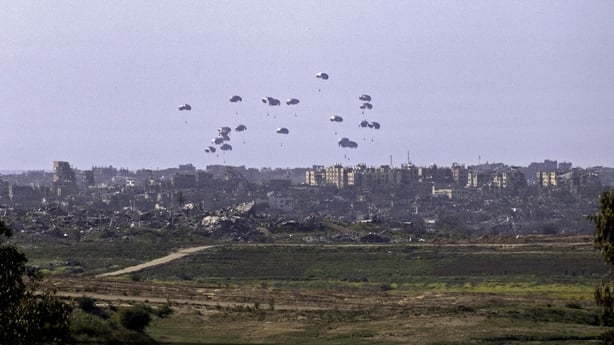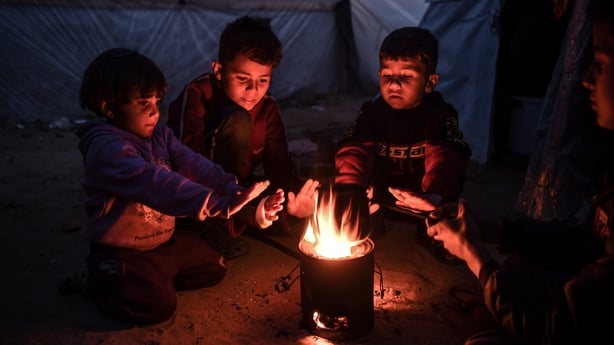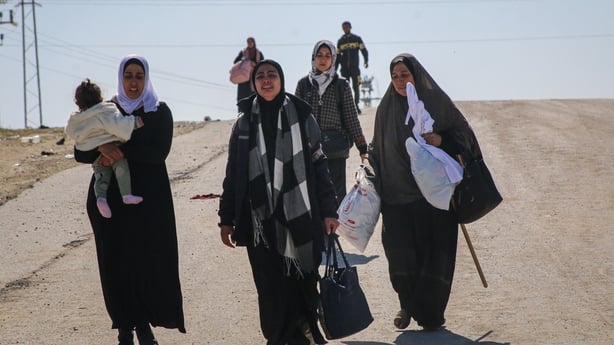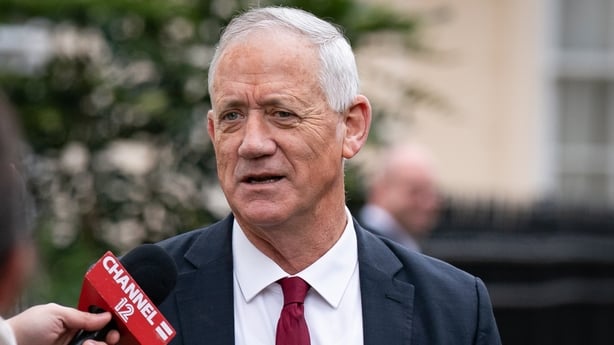Hunger in Gaza has reached "catastrophic levels" and children are dying of starvation, the UN's Humanitarian Coordinator for the Occupied Palestinian Territory has said.
Jamie McGoldrick said aid supplies into Gaza have fallen by half from January to February due to "serious constraints" in access through Israel and Egypt.
He said "a predictable supply of essentials" into Gaza at a minimum of 300 trucks a day was needed, via the crossings at Rafah and Kerem Shalom.
The UN was hoping to soon use a military access road that runs up the eastern side of Gaza to deliver aid to the north, he told reporters.
Mr McGoldrick said he visited camps for displaced Palestinians in southern Gaza and spoke to women who said they were experiencing sexual harassment due to a lack of privacy.
They also described their lack of basic supplies including clean water, sanitary hygiene products and undergarments.
"One woman described her journey to the camp from Khan Younis at the end of January and she said she'd given birth earlier two days earlier," Mr McGoldrick told reporters.
"She was forced to leave her home and go to this camp with her other four children - one of them is disabled - and she was held at the checkpoint for six hours before she could move on," he said.
Parents in the camp described the lack of adequate food to feed their children and desperate living conditions, McGoldrick said.
"And one of the women said to me at night when you walk through the camps, you can hear the woman crying in the tents," he said.
He said the few aid convoys getting into the north of Gaza, were being attacked by people desperate for food and supplies.
"These people are so desperate that they stop the truck, and they systematically ransack the truck and take all the goods off the back," he said.
Mr McGoldrick said he was very worried about the possibility of an Israeli ground incursion into Rafah, where 1.4 million people are sheltering.
Talks on Gaza ceasefire, hostage exchange deadlocked
He was speaking as talks on a ceasefire and hostage exchange between Israel and Hamas are at an impasse.
Negotiators from the Palestinian militant group, Qatar and Egypt, but not Israel, are trying to secure a 40-day truce in time for the Muslim fasting month of Ramadan, which begins early next week.
Urging Hamas to accept the terms on the table, US President Joe Biden said that Israel was cooperating and "a rational offer" had been made for a ceasefire in exchange for the release of Israeli hostages.
"It's in the hands of Hamas right now," he told reporters, warning that it would be "very dangerous" if fighting continued into Ramadan.
Hamas pledged to continue to take part in the Cairo talks, but officials in the militant group said a ceasefire must be in place before hostages are freed, Israeli forces must leave Gaza and all Gazans must be able to return to homes they have fled.
"We are showing the required flexibility in order to reach a comprehensive cessation of aggression against our people, but the occupation is still evading the entitlements of this agreement," Hamas said in a statement.

A source had earlier said that Israel was staying away from the Cairo talks because Hamas refused to provide a list of hostages who are still alive.
The group says this is impossible without a ceasefire as hostages are scattered across the war zone.
Israeli forces, which began their offensive in Gaza after the deadly Hamas raid on Israel on 7 October, have continued bombarding the Palestinian enclave since the talks began in Cairo on Sunday, and the dire humanitarian situation in the densely populated coastal strip has deteriorated further.
"Every day costs us dozens of martyrs [dead]. We want a ceasefire now," Shaban Abdel-Raouf, an electrician and father of five from Gaza City, who is now in the southern city of Khan Younis, said.
Health officials in Gaza said the number of people confirmed killed in Israel's offensive has passed 30,700.
They reported 86 deaths in the past 24 hours and witnesses said the Israeli bombardments continued in parts of Khan Younis, the southern city of Rafah and areas in central Gaza.

A deal is being sought before Ramadan because Palestinian-Israeli violence in Israel and the occupied Palestinian territories often spikes during the fasting month, as does hostility towards Israel in the Arab and Muslim world, creating a strong incentive for leaders to clinch a deal before then.
The United States is also worried that the Gaza conflict could spread further across the Middle East, especially after a series of attacks on vessels in the Red Sea by Iran-aligned Houthi forces acting in solidarity with Palestinians.
At least two sailors have been killed in the latest incident, according to US officials.
The proposals presented to Hamas would see the group free some of the hostages it holds following the 7 October attack, in which Israel said 1,200 people were killed and 253 abducted.
Aid to Gaza would be increased to try to avert famine as hospitals treat acutely malnourished children, and Hamas would provide a list of all the hostages held in Gaza.

The miltant group said any exchange of prisoners cannot take place until after a ceasefire.
Israel wants merely a pause in fighting to get hostages out of Gaza and more aid in, adding that it will not end the conflict before Hamas is "eliminated".
Senior Hamas official Bassem Naim said the group had presented its own draft deal and was awaiting a response from Israel, and that "the ball now is in the Americans' court".
Yesterday, the US revised language in a draft United Nations Security Council resolution to back "an immediate ceasefire of roughly six weeks in Gaza together with the release of all hostages".
The new text reflected blunt remarks by Vice President Kamala Harris urging Israel to do more to ease the "humanitarian catastrophe" in Gaza.
UK foreign minister David Cameron echoed her comments at a meeting with Israeli war cabinet member Benny Gantz in London.
Mr Cameron said that he "pressed Israel to increase the flow of aid into Gaza" and "conveyed the UK's deep concern about the prospect of a miltary offensive in Rafah".

Gaza health ministry spokesperson Ashraf Al-Qidra said that a 15-year-old girl had died in a Gaza City hospital from dehydration and malnutrition, describing her as the 18th such victim in just over a week.
Israel has said it is committed to improving the humanitarian situation in Gaza and there is no limit on aid for civilians. It has blamed the UN for any delivery problems.
Gaza hostages risk lasting psychological trauma - experts
Any hostages released by Hamas face the risk of lasting psychological trauma, experts warned, citing the suffering of people freed previously.
"There are some that are living dead. As if they were frozen in time and place in Gaza, and haven't returned," said Merav Roth, a clinical psychologist who treated some of the former captives and their families.
"We're going to have to immediately take care of these hostages ... to help them overcome their fear and their stupor and bring them back to real life," Marilyne Baranes, a psychologist who specialises in post-traumatic stress disorder (PTSD), said.
Of the approximately 100 Israeli hostages freed under an earlier ceasefire agreement, half are undergoing treatment or therapy, the country's government said.
Those who were kept in dangerous or traumatic conditions, experience "more severe symptoms of anxiety, depression", Ms Roth said.
"But among them all, there's great difficulty in returning to functionality."
A 2009 study in the Journal of the Royal Society of Medicine concluded: "As yet there is no clear delineation of all factors which conduce to an adverse outcome following being taken hostage".
The researchers found evidence that those facing worse after-effects include women, people with little education and those held for long periods - as is the case with the hostages in Gaza.
However, the findings are dated and studies are difficult to carry out.
"For ethical and practical reasons, particularly if children are involved, the follow-up of hostages on release is difficult," the research found. "Thus, the scientific and clinical database is relatively modest".
Many studies are based on autobiographies by former hostages which gives a limited point of view.
Experts agree that a lot depends on the first few hours after a hostage is released.
"You can get over this type of thing, but you won't go back to the way you were," Ms Baranes said.
Additional reporting Reuters






